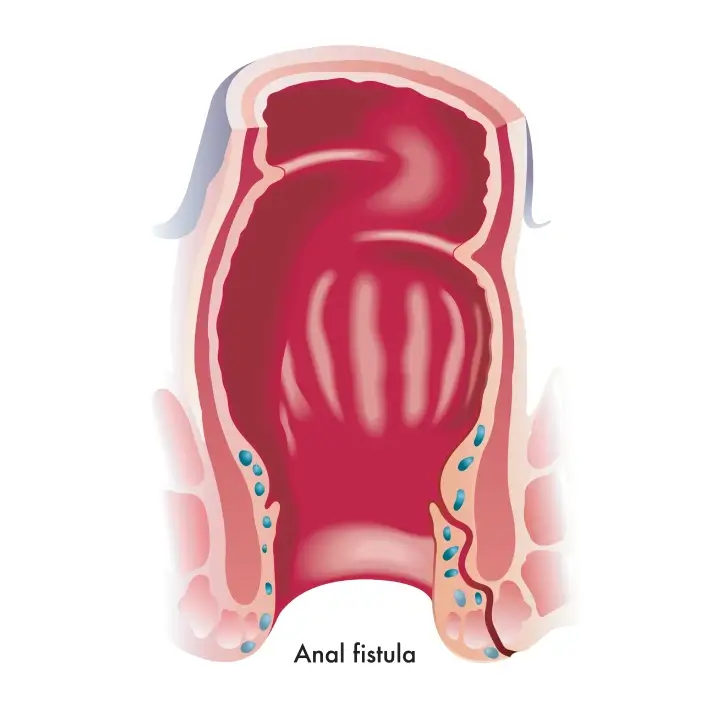What's an Anal Fistula?
What is an
Anal Fistula?
What is an
Anal Fistula?
An anal fistula is a small and abnormal tunnel formed between the inside of the anal canal and the skin near the anus. It is often caused by an abscess or an infection that has not healed, and can lead to ongoing irritation, leakage, or swelling.
Anal fistulas are not life-threatening, but they can greatly impact your quality of life. Left untreated, they can recur and cause constant discomfort. Fortunately, they can be treated effectively. The sooner an anal fistula is addressed the easier it is to manage.
Anal fistulas are not life-threatening, but they can greatly impact your quality of life. Left untreated, they can recur and cause constant discomfort. Fortunately, they can be treated effectively. The sooner an anal fistula is addressed the easier it is to manage.
How Are Anal Fistulas Formed?
Anal fistulas are developed when a tiny gland in the anus, referred to as the anal gland, becomes infected (due to blockage). Anal glands usually produce fluid that assist with bowel movement, but if the gland gets clogged, bacteria or foreign matter can enter through the gland and quickly multiply, causing an infection.

The process often is as follows:
- Blockage and Infection – The anal glands get blocked and infected, resulting in swelling and pain.
- Abscess Formation – Due to the infection, a collection of pus (abscess) will form near the anus. This may cause intense discomfort and fever.
- Drainage – The abscess may burst on its own or get drained during medical treatment. When it has drained, the infection often leaves behind a narrow tunnel that connects the inside of the anus to the skin (fistula).
- Persistent Tunnel – Because this tunnel does not fully heal (close) on its own, bacteria can still enter through it, allowing repeated infection and discharge to occur.
Common Symptoms to Look Out For
Symptoms of an anal fistula can vary in severity:
- Pain or throbbing around the anus
- Redness, swelling, or a small lump near the anus
- Recurring discharge (pus/blood)
- Frequent and painful abscesses
- Fever
Even if your symptoms seem minor or irregular, they could still be indicative of an underlying fistula. Anal fistulas rarely heal on their own, and putting off getting treatment could allow it to become harder to manage.
If you notice symptoms of an anal fistula, seek medical attention.
Book a consultation for an assessment today.
Types of Anal Fistulas
Anal fistulas can vary in complexity:
Simple Fistulas
A single, straightforward tunnel near the surface of the skin; this type of fistula is easier to treat.
Complex Fistulas
The tunnel may have multiple branches or pass through more muscle, requiring specialised treatment.
High or Low Fistulas
These are determined by their relationship to the anal sphincter muscles. Low fistulas are easier to manage while high fistulas are more complicated.
Our colorectal specialist will examine and determine the fistula type during diagnosis, after which the safest and most effective treatment will be recommended.
From accurate diagnostics to minimally invasive treatments,
we offer personalised treatment for all types of anal fistulas.
message Us
Worried About Your Symptoms?
We’re Here to Help.
It is normal to feel uneasy, especially if you are dealing with an unfamiliar and sensitive condition. If you are experiencing symptoms of anal fistula, please book a consultation with Dr Tan today at 6454 0054 or click here to WhatsApp.
Alternatively, fill in the appointment form below and we’ll be in touch with you shortly.
Alternatively, fill in the appointment form below and we’ll be in touch with you shortly.
Our Clinic Location:
Mount Elizabeth Medical Centre
#08-07, 3 Mount Elizabeth, Singapore 228510
| Tel | : 6454 0054 |
| Fax | : 6764 0054 |
| : ask@surgicalassociates.sg |
Opening Hours:
| Mon to Fri | : 9am to 5pm |
| Sat | : 9am to 1pm |
| Sun & PH | : By Appointment Only |